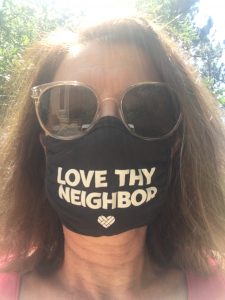Pandemic perks. I love it when people share genuine bright spots in our current difficult situation. I’m super-curious about how this pandemic will shape life as we know it. As a leader, I’m compelled to ask myself, what can I influence to change for the better for the future? What new habits or ways of life will become ingrained in me and our organization due to this extended, unintended social experiment with remote work? How can I be intentional about what sticks and what is best left in the rearview mirror of COVID-19?
New Approach to Work
I’ve heard so many people say that they’ve learned new ways to work, adapting on the spot to new realities. I would agree that some things that our organization – and maybe I – was dragging our feet on or that we would have taken years to plan, test, and evaluate got implemented in record speed. Some of these new ways of operating feel like better ways.
Knocking out old habits can make room for the new. Meetings are an easy example. Meeting virtually has created a new approach that is more agile. Our executive team meets in shorter bursts more frequently rather than setting aside much of one day a week. We are able to respond to the pressing and often changing needs of the current environment more quickly this way. While I can’t predict if this way of operating will be more or less effective in the “next normal,” I and the team are certainly more willing and able to try it now than we would have been earlier this year.
Another good example of a new way of operating is offering online programming. There were so many barriers to gaining traction before, including organizational capacity and will, not to mention the technology challenges. Other questions about complicated issues like copyright and digital rights slowed our progress. When everything went virtual almost overnight, and some regulations were relaxed, we were able to step into this new world and test things out with a forgiving and often grateful audience. With some lowered expectations for ourselves and from our audience, we were able to do our best and then do better.
Sustainability
I’ve read and heard it mentioned more than once that one way life as we know it will change is that just like better meeting habits, we may be creating new sustainability habits. A small example that – when multiplied over hundreds of staff could have real impact – is the printing of documents. I used to print out important documents for review. I thought I needed a print out to write my notes for the best understanding of what I was reading. When thrust into my remote work environment, I could have adjusted my home set up to print but didn’t ever feel the need. I adapted. I haven’t printed out a document for work since March 15th and haven’t missed it. Board meetings used to come standard with reams of printed documents. We really wanted to get out of this habit, but something else always took precedent. Now that we’ve been meeting exclusively online, everyone has gotten very comfortable with digital documents only. I’m excited to carry this shift away from paper back to our in-person world.
My regular commute used to be about an hour each way each day. In this remote work environment, I am one less car on the road, not only in terms of wear and tear on the road and my car, but also in terms of amount of traffic and commute time for others. I’m eager for our organization to learn from these new habits and see how we can help reduce the horrific traffic in metro Denver by creating improved flexible work arrangements.
In my personal life, I find I am generally consuming less stuff. Despite working more hours than ever in my career, my being forced to reduce activities like vacations and going out with friends, led to my cleaning out all the years of detritus that had accumulated in my basement and garage. Now that I feel the freedom of having less, I want less. I am buying almost nothing other than consumables right now. While I know this is a problem for the economy, I hope that for myself at least, my consumerism will be more mindful and less impulsive in the future. This feeling makes me wonder what other detritus or career clutter I could be cleaning out to improve my focus on what’s really important to our organization, my profession, and our larger community. Two things come to mind: double down on 1. mental wellness and 2. equity.
1. Destigmatizing Mental Health
When I think about the possible lasting effects of the pandemic, one swelling hope I have is that talking about mental wellness and supporting each other in our mental health becomes as natural in the workplace as checking on a co-worker who just sprained their ankle on a hike. We’re seeing a normalization of talking about mental health in the media and other social outlets. Are we moving towards true destigmatization?
Brene Brown is teaching our world about how leadership and vulnerability are inextricably intertwined. What can I do as a leader to show my own vulnerability and create a culture that sustains this pandemic perk so that it endures long after we’re back to meeting in person and sharing homemade treats in the break room?
2. DEI and Anti-Racism
For much of my career, I’ve been in a both a learner’s and leader’s role when it comes to supporting or initiating diversity, equity, and inclusion initiatives. As a cis-gendered, heterosexual, white woman with no visible disabilities, I’ve been humbled many, many times on this journey by people with lived experience different from mine. Just like with COVID, our current times are creating an opportunity – maybe a once-in-a-lifetime opportunity – for leaders of all kinds to demand and make seismic changes when it comes to creating systemic policies that are anti-racist, which is a first step in moving towards true equity. I’m ready for Life as I Know It to change.

Recommended Reading
How to Be an AntiRacist, Ibram X Kendi, 2019
Listening to the author read his words aloud made this an even more powerful experience. I learned how much more I have to learn. I’m inspired to do more and be better. I’m inspired to learn how to be an anti-racist.
How remote work will create economic winners and losers, Noam Scheiber, New York Times, July 27, 2020
I’m becoming more keenly attentive to issues around equity when it comes to flexible work arrangements. I appreciate the examples of possible organizational change for the future.
This Company’s Two Sentence Remote Work Policy is the Best I’ve ever Heard, Justin Bariso, Inc., 2020
Some simple concepts that resonate with our organizational values.

August 11, 2020 at 9:39 am
Great thoughts here Donna. For myself, I am trying to learn to lean into change. Lot’s of things that we love in our life, like favorite restaurants, going to movies or concerts, etc… may change in the future, so I am trying to lean into the change and find other things that fill my soul, so I don’t feel reduced by the change
August 2, 2020 at 7:50 pm
My long-distance book club (made up of old friends spread out around the country in a private FB group) is reading How To Be an Anti-Racist together. I’ve found it so helpful to discuss what we’re learning as we read it.
One of our family’s “pandemic perks” has been more time with our oldest before he leaves for his first year of college. We’re watching the HBO series of his favorite graphic novel, “Watchmen,” where one character is constantly eating Cheetos—not with chopsticks, but a fork!